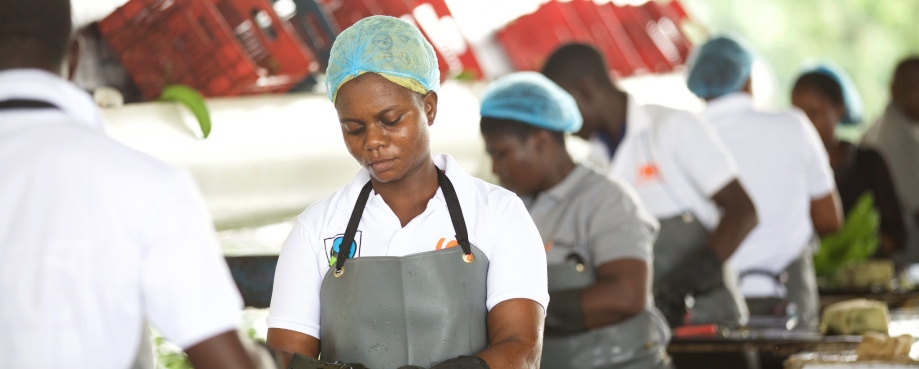
Following the third conference of the World Banana Forum, Jacqui Mackay of Banana Link discusses why rights education is key to securing decent work in the industry.
‘Now I am bold. I can talk to anybody. I can express myself anywhere just because I know my rights’.
These are the words of Caroline, a representative with the Fako Agricultural Workers Union (FAWU) in Cameroon, where together with the IUF and FAWU, Banana Link has been working on a capacity building programme to help workers know and secure their rights.
Last week, twelve representatives from African unions linked to the project participated in the third conference of the World Banana Forum in Geneva to share their challenges and advances, and most importantly to communicate with and learn from other stakeholders.
This year’s conference asked how we can achieve living wages and gender equity in the industry, and our partners in Cameroon and Ghana had a wealth of first-hand experience to offer.
Running from 2013 to 2016, the Comic Relief funded programme aimed to ‘Secure decent work in tropical fruit export production’ in both Cameroon and Ghana, based on the premise that workers need to know their rights in order to secure them and that elected representatives of independent unions need to have the capacity to negotiate effectively on behalf of workers.
Education, Education, Education
At the heart of the work has been the education of workers wherever possible, from the field to the trucks on the way to work. One representative described how he chooses a clause in the national labour code each week and then talks to his peers about this, gradually building their rights knowledge.
Over the project more than 10,000 workers participated in education sessions, while research showed a rise from 25 per cent to 65 per cent of workers in Cameroon who not only claimed to know their rights but could name them.
Pineapple and banana plantation owners reported significantly improved social dialogue, which in Cameroon resulted in improved working conditions, including in one year, a 48% reduction in pro rata deductions from wages. Meanwhile, FAWU reported a huge increase in grievances being settled in the field rather than coming to the union office.
However, perhaps the most striking impact of the project has been the work done to enable women to organise themselves and become more active decision makers both in their union and their workplace.
Last month nearly 30 FAWU women representatives and members gathered to share their achievements. These included successfully negotiating separate dressing rooms and toilets, women undertaking new roles such as welding or engineering and being trained for promotion to headwomen.
What’s more, during evaluation visits over the last year to Cameroon and Ghana we have continued to see highly motivated and skilled representatives resolving grievances, successfully negotiating improved workplace conditions, and consistently educating their members.
Education is a fundamental factor in enabling this change - whether it be helping a worker to understand the role of a Health and Safety Committee, giving women the confidence to speak up for their right to a workplace free of sexual harassment and gender based violence, developing the skills of an elected representative to handle grievances or building the capacity of a collective bargaining team.
That’s why, in the wake of this year’s conference, we’d like to urge all industry stakeholders to consider how they can help to ensure access to education at plantation level to empower women and men to secure decent work. Because it’s only when workers understand their rights that they are truly able to exercise them.
Download ‘Now I am Bold’ to read a brief impact report and watch our short film capturing the voices of some of those involved in the project detailed in this article.
